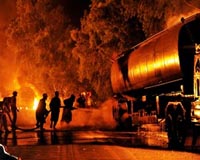| . |  |
. |
Charkusah, Afghanistan (AFP) Jan 17, 2011 "I'm 105 years old," said Bismiullah, an old man stopped by a patrol in southern Afghanistan as part of military efforts to map the population in the battle against the Taliban. Asked what he thinks of the US army, the Afghan army and the Taliban, Bismiullah responded: "I like myself and my family, that's it." Questioned who is in charge in the area, he was similarly direct: "Allah is my chief." The elderly man was stopped by a US-Afghan patrol in the village of Charkusah in the Zahri district of Kandahar, the southern Afghan province seen as the heart of the Taliban insurgency. Troops in the region and across Afghanistan are gathering photographs, fingerprints and employment details as well as canvassing opinions from local residents to find out what they want for the war-racked province. The goal is to strengthen relations between pro-government forces and the local population. But the information gathered can also help troops catch Taliban fighters, for example by matching fingerprints on home-made bombs or guns. Formally known as human terrain mapping, the process is an key strand of the strategy to build better ties between pro-government forces and local people as the war enters arguably its most important year. International troops in Afghanistan, around two-thirds of whom are from the United States, are due to start limited withdrawals in July ahead of a scheduled transition of responsibility for security to Afghan forces in 2014. Human terrain mapping was first used in its current form in Iraq in 2007 but experts say it also draws on the lessons of previous counterinsurgency campaigns such as in Vietnam. Counterinsurgency theory holds that the key to winning such wars is to destroy the insurgents' political control over the population. Identifying who is an innocent civilian and who is an insurgent is a vital element. However, gathering reliable information is not always easy in a country where many desperately poor rural people do not know basic information about themselves, such as their age. Afghanistan has not had a census since 1979, the year of the Soviet invasion, amid security concerns across the war-torn country. "What we do here comes from previous experience in Iraq and other parts of Afghanistan," explained Lieutenant Wes Pennington of Taskforce Strike, 101st Airborne. "The Taliban try to make their own COIN (counterinsurgency) tactics," he added. "But we have more to offer, we're better at it." In Charkusah, the Taliban is also trying to build support among the population, handing out money and buying harvests of marijuana and opium which they then sell on to finance their fighting, Pennington said. People in the village are notably reluctant to talk about the Islamist insurgents. Mohammad Sahim, a 32-year-old farmer, stressed that he knows "nothing at all" about the Taliban. As for improvements he would like to see in the local area, he stresses "food, water and a hospital". Staff Sergeant Alan Cable, who is asking the questions, said that such reticence about the Taliban is typical. "People usually say that they don't know anything," he explained. Captain Brett Matzenbacher, in charge of the nearby Pashmul South base, is realistic when it comes to the power of the Taliban. "The population is Taliban-influenced," he said. "But we provide an alternative to the Taliban, a district governor who is an official authority." The task at hand is immense and hard-won gains can be fragile. The Taliban would once again return to the area after the traditional winter lull was over in a few months' time, Cpt Matzenbacher added.
Share This Article With Planet Earth
Related Links News From Across The Stans
 Iran fuel ban targets NATO but hurts Afghans
Iran fuel ban targets NATO but hurts AfghansKabul (AFP) Jan 16, 2011 Iran's ban on fuel tankers crossing into Afghanistan over claims they are supplying NATO troops is snaring ordinary Afghans in a complex power game as winter living costs rise, experts say. Some 2,000 trucks are stranded on the Iranian-Afghan border, Afghanistan's commerce ministry says, in a standoff which has run since early December, heaping more misery on civilians in the war-torn, impov ... read more |
|
| The content herein, unless otherwise known to be public domain, are Copyright 1995-2010 - SpaceDaily. AFP and UPI Wire Stories are copyright Agence France-Presse and United Press International. ESA Portal Reports are copyright European Space Agency. All NASA sourced material is public domain. Additional copyrights may apply in whole or part to other bona fide parties. Advertising does not imply endorsement,agreement or approval of any opinions, statements or information provided by SpaceDaily on any Web page published or hosted by SpaceDaily. Privacy Statement |